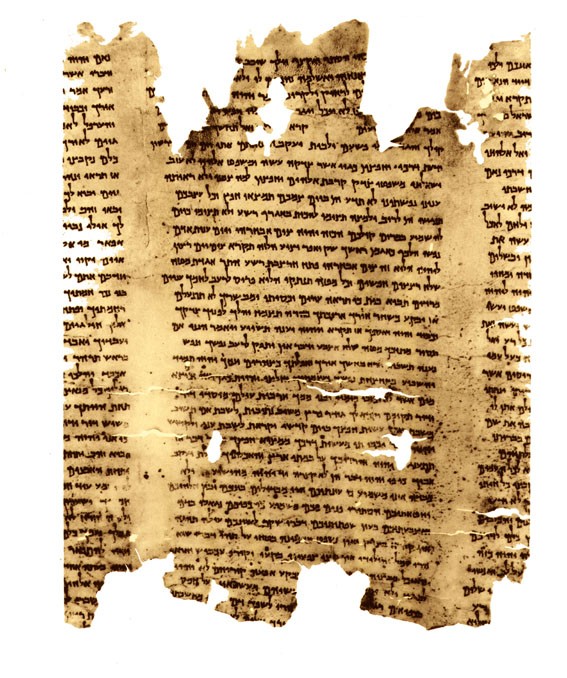 The Bible: not so much holy as full of holes.
The Bible: not so much holy as full of holes.
So much hinges on the fallacy that the Bible is the literal, inerrant Word of God. As the ‘director’ of Christian Voice, Stephen Green, puts it:
We believe the Holy Bible to be the inspired, infallible, written Word of God to whose precepts, given for the good of nations and individuals, all man’s laws must submit.
Try as you might, you will not find the Bible claiming it is the Word of God, capitalised or otherwise. The phrase does appear, without the capital W, but on none of these occasions is the Bible referring to itself.
Christians usually base their conviction that the Bible is the Word of God on a verse in 2 Timothy (3.16):
All scripture is inspired by God and profitable for teaching, for reproof, for correction, and for training in righteousness.
There are some serious problems with this claim.
Firstly, the ‘scripture’ to which 2 Timothy 3.16 refers cannot be the Bible as we know it today. This was not compiled until about 260 years after these words were written*. At best, the author of 2 Timothy is referring to the first five books of the Bible – the Pentateuch – and maybe, possibly, though we cannot know for certain (you see how tentative it is?) some of the writing he had encountered that was eventually included in the New Testament.
By the same reckoning though, he could equally be referring to books that at one time were considered to be inspired but did not make it into the final 27 books of the New Testament**. This is also why the use of the term ‘the word of God’ in other places in the New Testament cannot be referring to the Bible as a whole. No-one knew when using the phrase in its original context that there was going to be a Bible, let alone one divorced from its Jewish roots.
Secondly, most scholars today are convinced that Paul did not write 2 Timothy, even though it claims that he is its author. There are very good reasons for saying the letter was written between 100-150CE, thirty-six years, at the very least, after Paul’s death in 64CE. In other words, 2 Timothy is a fake, claiming to be written by one person – Paul – when it is in fact the creation of another, taking advantage of the reputation of the more well-known writer.
How far can such a false witness be trusted? Most people in any other context would say not at all. And yet Christians take this forger’s letter to be ‘inspired by God’, just because it says it is. In essence they are saying that God is happy to inspire forgery, and not just in this instance either: none of the ‘pastoral’ letters (1 and 2 Timothy, together with Titus) is written by Paul, even though all of them claim to be. The second letter to the Thessalonians and those to the Ephesians and Colossians are not by him either; 1 and 2 Peter are not by the (illiterate) apostle Peter and the letters of James and Jude, while wanting us to think that they are, are not by Jesus’ brothers***.
In short, and as Bible scholar Bart Ehrman puts it:
Many of the books of the New Testament were written by people who lied about their identity, claiming to be a famous apostle — Peter, Paul or James — knowing full well they were someone else. In modern parlance, that is a lie, and a book written by someone who lies about his identity is a forgery.
Christians do not accept that the Qur’an is the word of God (Allah), nor the book of Mormon, even though both say they are, so why do they take it on trust, from a forged document that was lucky enough to find its way into the New Testament, that it and all other ‘scripture’ is inspired? ‘Faith’, they would tell you; but in this as in many other contexts, it is extremely misguided faith.
Notes:
* For the Bible’s late compilation see Charles Freeman (2008) Heretics, Pagans and the Christian State, p42
** For non-canonical texts once considered contenders see Bart Ehrman (2009) Jesus Interrupted: Revealing the Hidden Contradictions of the Bible, chapter 4
*** Forgeries in the New Testament are discussed more fully in Ehrman (2011) Forged: Writing in the Name of God – Why the Bible’s Authors Are Not Who We Think They Are: The pastoral letters – pp96-103; 2 Thessalonians – pp105-108; Ephesians – pp108-112; Colossians – pp112-114; Jude – pp186-188; James – pp192-198. Peter’s illiteracy is noted in the Bible itself (Acts 4.13) and is discussed on pp75-76 of Forged.
UK editions referenced.

After earnestly praying to God to show me the truth i bought a book at a used bookstore by Elaine Pagels,in which she quoted Ehrman’s Lost Christianities.I was so interested that I found and read that book followed by others by Dr Bart.I knew he was taboo but I was looking for the truth of Christianity so if he was mistaken i would know.I wasn’t looking to doubt or no longer believe in Christianity,but after reading his books I realized he was right so I had no other choice then but to acknowledge the truth,that Christianity isn’t true.My deconversion has been a process but I’m so glad it happened and I appreciate Dr Ehrman and sites like this .
LikeLike
Bart Ehrman’s books are excellent (as are Elaine Pagels.) The Bible is a seriously flawed text, created by primitive tribesmen and 1st & 2nd century zealots, and cobbled together by those with a vested interested in its preservation. Its modern elevation as ‘God’s Word’ is pure idolatry. As you say, it makes little sense and is so ambiguous it can be made to say whatever anyone wants it to say.
LikeLike